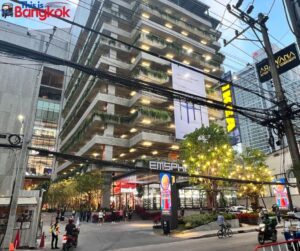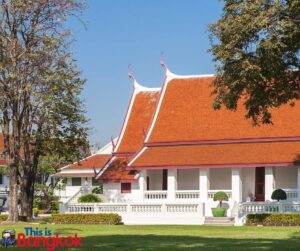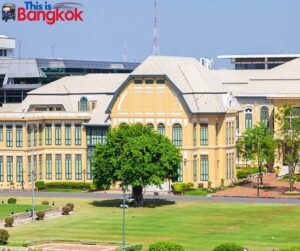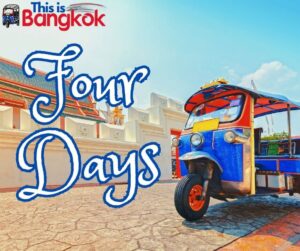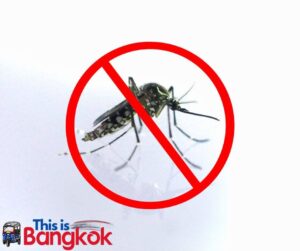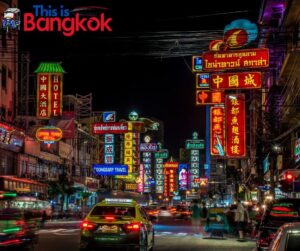Many people speak English in Bangkok, Thailand, especially in tourist areas and business districts.
English is often used as a second language in the country, particularly in urban areas and industries catering to international visitors.
However, the proficiency level can vary from person to person, with some individuals being more fluent than others.
English proficiency might be less common in more rural or less touristy areas, but you can generally expect to find English speakers in Bangkok.
It’s always helpful to learn a few basic phrases in Thai to enhance your communication and show respect for the local culture.

Can you get by with English in Bangkok?
Yes, you can generally get by with English in Bangkok.
As mentioned earlier, many people in the city, especially those in the service industry, such as hotels, restaurants, and shops, will likely have at least a basic understanding of English.
Signs, menus, and other essential tourist information are often in English.
However, while English is widely spoken, there might still be instances where you encounter individuals with limited English proficiency, especially in more local or non-touristy areas.
In such cases, having a few basic phrases in Thai or using gestures to communicate can be helpful.
Overall, Bangkok is a popular tourist destination, and the city has developed to accommodate international visitors, so you should generally be able to navigate and communicate using English.
What percent of Bangkok speaks English?
Thai is the predominant language spoken in Thailand, accounting for 92.7% of the population.
Additionally, approximately 44.6% of the populace is proficient in English, contributing to the country’s multilingual and culturally diverse environment.
English proficiency in Bangkok varies widely depending on education, occupation, international tourism, and business exposure.
It’s estimated that a significant portion of the urban population, particularly those working in the tourism, hospitality, and business sectors, have at least some level of English proficiency.
In recent years, Thailand has been trying to improve English education in schools, and younger generations are generally more likely to have some command of the language.
It’s important to note that while many people in Bangkok may understand and speak basic English, the level of fluency and proficiency can vary widely.
Can you live in Bangkok without speaking Thai?
Yes, living in Bangkok without speaking Thai is possible, especially in the city’s more cosmopolitan and tourist-friendly areas.
Many expatriates and foreigners do live in Bangkok without being fluent in Thai.
English is commonly used in various aspects of daily life, such as in international schools, businesses, restaurants, and entertainment venues.
However, there might be challenges and limitations if you don’t speak Thai.
While you can manage most essential tasks and interactions in English, there could be instances where you encounter difficulties, especially in less touristy or more local areas where English proficiency might be lower.
Learning some basic Thai phrases and cultural norms can enhance your experience and interactions, as it shows respect for the local culture and can make your daily life smoother.
Overall, while living in Bangkok without speaking Thai is possible, having some knowledge of the language can significantly enrich your experience and help you navigate the city more effectively.
How English-friendly is Thailand?
Thailand is relatively English-friendly, particularly in urban areas and major tourist destinations. English is commonly used in the tourism, hospitality, and business sectors. Many signs, menus, and essential tourist information are often in English.
Here are some ways in which Thailand is English-friendly:
Tourist Areas
Many people can communicate in English in popular tourist areas like Bangkok, Phuket, Chiang Mai, and resort destinations.
Hotels, restaurants, and shops in these areas usually have English-speaking staff.
Tourist Services
Tourism is a significant industry in Thailand, and service providers are accustomed to dealing with international visitors. You can find English-speaking tour guides, travel agencies, and transportation options.
Education
Many Thai people, especially younger generations, are learning English in school. This has improved English proficiency among the population, particularly in urban areas.
Business and International Relations
English is often used as the language of business and international communication. Many Thai professionals have a working knowledge of English.
Online Resources
With the advent of technology, you can easily access English-language websites, maps, apps, and resources for navigating and exploring Thailand.
However, it’s important to note that English proficiency can vary widely among individuals.
While you can get by with English in many situations, there might be instances where you encounter language barriers, especially in more local or rural areas.
Learning a few basic phrases in Thai and showing respect for the local culture can go a long way in enhancing your experience in Thailand.
In conclusion
So, the bottom line is, while your English will get you by in Thailand, it might not be your all-access pass to every nook and cranny.
Sure, the city slickers and tourist hotspots will understand your “two beers, please” without a hitch, but don’t be surprised if your request for “more peanuts” gets lost in translation at the local market.
So, while you may not need to be fluent in Thai, a few phrases might make your journey smoother and more engaging.
So, pack your bags and maybe a Thai phrasebook, and get ready to dive into the wonderfully diverse world of Thailand!




